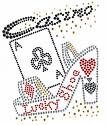 To start off you may wonder what the most visited websites are in the world? The answer: Online Gambling. In online gambling, people can play casino games such as roulette, blackjack, hold'em, slot machine games, pachinko, baccarat and many others. These games are played against the "house", which makes makes money due to the fact that the odds are in its favor. I mean, let's be honest here, if the house wasn't "supposed" to win gambling in general (online or at a casino) wouldn't have the funds to continue operating its fun, attractive, whole-in-your-pocket ways. And trust me, they do. There is also online sports betting, where you can bet on odds or "spreads" on upcoming or popular sporting events. And then there's the attractive, always crowd-pleasing poker rooms, where rather than playing against the house, you sit at a table with up to 10 players and try to take each other's chips while the house "rakes" pots, or takes a percentage of each pot.
To start off you may wonder what the most visited websites are in the world? The answer: Online Gambling. In online gambling, people can play casino games such as roulette, blackjack, hold'em, slot machine games, pachinko, baccarat and many others. These games are played against the "house", which makes makes money due to the fact that the odds are in its favor. I mean, let's be honest here, if the house wasn't "supposed" to win gambling in general (online or at a casino) wouldn't have the funds to continue operating its fun, attractive, whole-in-your-pocket ways. And trust me, they do. There is also online sports betting, where you can bet on odds or "spreads" on upcoming or popular sporting events. And then there's the attractive, always crowd-pleasing poker rooms, where rather than playing against the house, you sit at a table with up to 10 players and try to take each other's chips while the house "rakes" pots, or takes a percentage of each pot. It has been said that online gambling is most popular amongst college students. I feel that younger people tend to be involved in "risk-taking" behavior as well as more likely to use computers. This could easily become a problem amongst college students and young adults within the age group. David Robertson, former chairman of the National Coalition Against Legalized Gambling, agreed that Internet gambling is a problem that only promises to hook many more gamblers into a life of addiction. "Statistics prove that teenage Internet gambling is the fastest growing addiction of the day, akin to drug and alcohol abuse in the 1930s," Robertson said. "It's pernicious, it's evil, it's certainly one that feeds on those who are the weakest members of society -- and that's the young and the poor."
It has been said that online gambling is most popular amongst college students. I feel that younger people tend to be involved in "risk-taking" behavior as well as more likely to use computers. This could easily become a problem amongst college students and young adults within the age group. David Robertson, former chairman of the National Coalition Against Legalized Gambling, agreed that Internet gambling is a problem that only promises to hook many more gamblers into a life of addiction. "Statistics prove that teenage Internet gambling is the fastest growing addiction of the day, akin to drug and alcohol abuse in the 1930s," Robertson said. "It's pernicious, it's evil, it's certainly one that feeds on those who are the weakest members of society -- and that's the young and the poor."This charts shows how each year these online gambling sites increasingly rake in your hard-earned moolah. It even suggests there will be a consistent increase in 2010 of approximately $24.5 billion dollars. So as online gambling may be a problem to some, it sure as hell isn't a problem to the online gambling sites set up in international waters and islands where it is completely legal to snag your cash with the click of a button. You may have your ups and downs and highs and lows but in the end the House always wins.



 In gambling there is that feeling of euphoria when you hit the "big one" in which every player yearns to do just that. After all, I've never met anyone who "plays to lose." What's the fun in losing? Gambling requires you to be a risk taker. After all, John D. Rockefeller and Henry Flagler wouldn't have accomplished and gained anything in their lives if it wasn't for taking a chance on something, knowing that at any point they could possibly lose it all. I consider these early entrepreneurs some of today's original "risk-takers."
In gambling there is that feeling of euphoria when you hit the "big one" in which every player yearns to do just that. After all, I've never met anyone who "plays to lose." What's the fun in losing? Gambling requires you to be a risk taker. After all, John D. Rockefeller and Henry Flagler wouldn't have accomplished and gained anything in their lives if it wasn't for taking a chance on something, knowing that at any point they could possibly lose it all. I consider these early entrepreneurs some of today's original "risk-takers."




